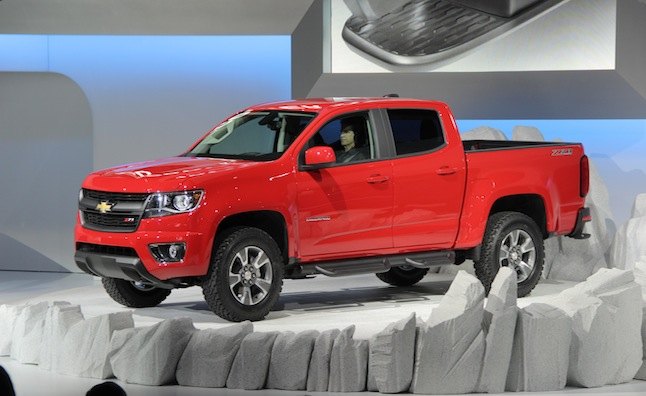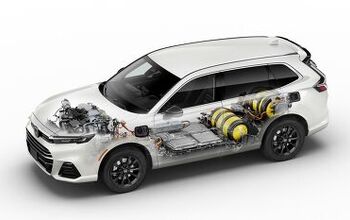QOTD: Chevrolet Colorado To Render Other Trucks "Obsolete"
Today’s quote of the day comes from GM’s Jim Cain (not to be confused with our own Tim Cain), who is quoted by Automotive News as making some rather bold predictions for the upcoming Chevrolet Colorado mid-size truck.
Speaking to AN about possible cannibalization on the part of the Colorado, Cain said
“We’re not worried about the Chevrolet Colorado attracting would-be Silverado customers…The people who should be worried are the ones who orphaned their mid-size truck customers, and those who sell trucks that are about to be rendered obsolete.”
I’m not sure which trucks will be “rendered obsolete”. The Tacoma? The Frontier? The V6 F-150? The GM full-sizers that have to be redesigned in 2018 due to what many observers agree is a botched launch?
As someone who prefers smaller vehicles and lives in region with high gas prices, the emotional appeal of a mid-sizer is there. But the business case is weak. Market share for smaller trucks is just 225,000 units, in a truck market worth 1.6 million units overall and a total car market with a SAAR of around 16 million. And the majority of that one segment belongs to just one truck, the Toyota Tacoma.
The main selling points of a smaller truck, namely price and fuel economy, have been eroded by increasing full-size fuel economy and lower prices. Anyone who has seen the new GM mid-sizers knows that they aren’t all that mid-size: they have a footprint similar to a GMT900 pickup, as opposed to a Ranger. And too few Americans have the sort of space constraints – the kind that necessitate these trucks in world markets – that would make a mid-size truck successful.
Corporate communication strategy dictates that the sort of tough talk that Cain is relaying is essential to their messaging, especially in such uncharted territory. But it’s difficult to take take in these claims with a straight face, especially when every other factor indicates a different outlook. Of course, I could be wrong. Maybe the Colorado is a game changer.
More by Derek Kreindler
Latest Car Reviews
Read moreLatest Product Reviews
Read moreRecent Comments
- W Conrad I'm not afraid of them, but they aren't needed for everyone or everywhere. Long haul and highway driving sure, but in the city, nope.
- Jalop1991 In a manner similar to PHEV being the correct answer, I declare RPVs to be the correct answer here.We're doing it with certain aircraft; why not with cars on the ground, using hardware and tools like Telsa's "FSD" or GM's "SuperCruise" as the base?Take the local Uber driver out of the car, and put him in a professional centralized environment from where he drives me around. The system and the individual car can have awareness as well as gates, but he's responsible for the driving.Put the tech into my car, and let me buy it as needed. I need someone else to drive me home; hit the button and voila, I've hired a driver for the moment. I don't want to drive 11 hours to my vacation spot; hire the remote pilot for that. When I get there, I have my car and he's still at his normal location, piloting cars for other people.The system would allow for driver rest period, like what's required for truckers, so I might end up with multiple people driving me to the coast. I don't care. And they don't have to be physically with me, therefore they can be way cheaper.Charge taxi-type per-mile rates. For long drives, offer per-trip rates. Offer subscriptions, including miles/hours. Whatever.(And for grins, dress the remote pilots all as Johnnie.)Start this out with big rigs. Take the trucker away from the long haul driving, and let him be there for emergencies and the short haul parts of the trip.And in a manner similar to PHEVs being discredited, I fully expect to be razzed for this brilliant idea (not unlike how Alan Kay wasn't recognized until many many years later for his Dynabook vision).
- B-BodyBuick84 Not afraid of AV's as I highly doubt they will ever be %100 viable for our roads. Stop-and-go downtown city or rush hour highway traffic? I can see that, but otherwise there's simply too many variables. Bad weather conditions, faded road lines or markings, reflective surfaces with glare, etc. There's also the issue of cultural norms. About a decade ago there was actually an online test called 'The Morality Machine' one could do online where you were in control of an AV and choose what action to take when a crash was inevitable. I think something like 2.5 million people across the world participated? For example, do you hit and most likely kill the elderly couple strolling across the crosswalk or crash the vehicle into a cement barrier and almost certainly cause the death of the vehicle occupants? What if it's a parent and child? In N. America 98% of people choose to hit the elderly couple and save themselves while in Asia, the exact opposite happened where 98% choose to hit the parent and child. Why? Cultural differences. Asia puts a lot of emphasis on respecting their elderly while N. America has a culture of 'save/ protect the children'. Are these AV's going to respect that culture? Is a VW Jetta or Buick Envision AV going to have different programming depending on whether it's sold in Canada or Taiwan? how's that going to effect legislation and legal battles when a crash inevitibly does happen? These are the true barriers to mass AV adoption, and in the 10 years since that test came out, there has been zero answers or progress on this matter. So no, I'm not afraid of AV's simply because with the exception of a few specific situations, most avenues are going to prove to be a dead-end for automakers.
- Mike Bradley Autonomous cars were developed in Silicon Valley. For new products there, the standard business plan is to put a barely-functioning product on the market right away and wait for the early-adopter customers to find the flaws. That's exactly what's happened. Detroit's plan is pretty much the opposite, but Detroit isn't developing this product. That's why dealers, for instance, haven't been trained in the cars.
- Dartman https://apnews.com/article/artificial-intelligence-fighter-jets-air-force-6a1100c96a73ca9b7f41cbd6a2753fdaAutonomous/Ai is here now. The question is implementation and acceptance.


































Comments
Join the conversation
Just saw an ad banner right here on TTAC offering $7,500.00 or so in discounts for a full size Chevy, 4X4, V8...that will catch fire and have a knock-on effect of the Colorado. Or so it would seem.
If my buddies Frontier is anything to go buy it and the Taco are already very obsolete starting with the abysmal fuel economy with the V6.